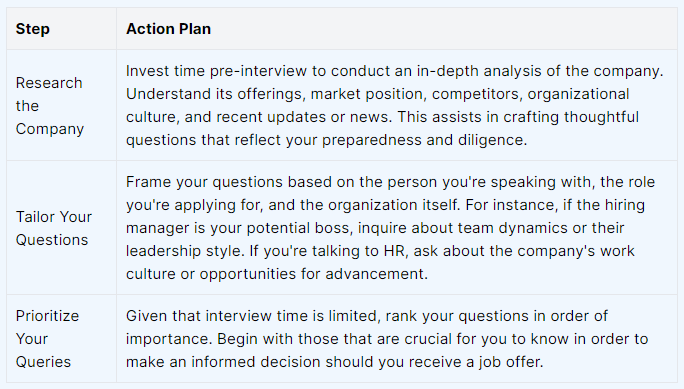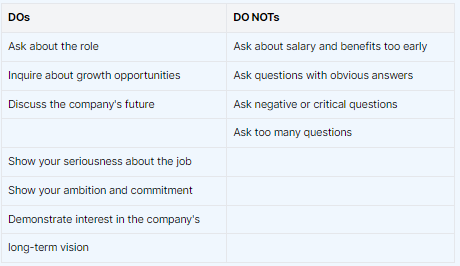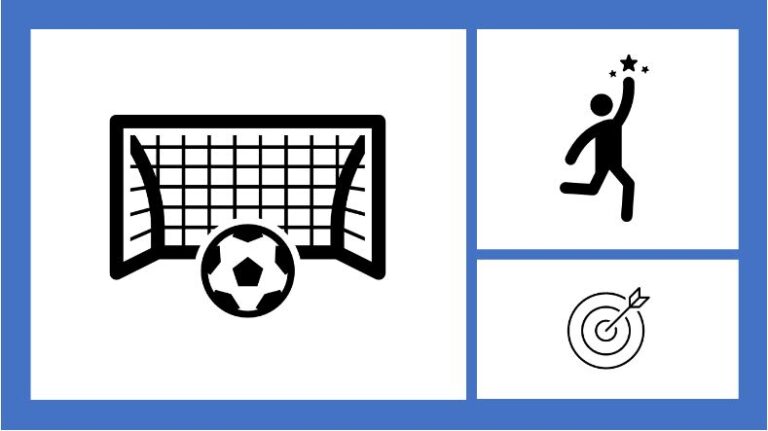How To Answer “Do You Have Any Questions For Us” + 10 Powerful Examples

Job interviews and the hiring process can be nerve-wracking. Most of us spend a considerable amount of time preparing for the interview questions we expect to be asked. However, there’s one question the interviewer asks that often leaves candidates stumped: “Do you have any questions for us?” This question is not just a polite way to conclude the job interview. It offers a unique opportunity for candidates to demonstrate their interest in the role and the company.
Here are some helpful job interview related blogs
- Tackling the final interview round
- How to answer ‘tell me about yourself’
- What are your career aspirations
- Why do you want this job
- Why should we hire you
- What are you passionate about
- Walk me through your resume
- How do you handle stress and pressure
- What are your goals
- What are your salary expectations
- Strengths and Weaknesses In Interview
- Interview questions for managers
- Interview questions for freshers
- Tips to succeed in a job interview
- Do you need a Career coach / Interview coach?
Understanding the Question
There are a few broad categories of questions; however, in most interviews, this is the last and critical question. Understanding what interviewers expect from this question will help you respond effectively. This question is sometimes asked during screening by human resources which is different to the one at the end of a full interview. There are several reasons why this is often asked:
Gauge your interest:
Your questions (or lack thereof) reveal your level of interest in the role and the company. If you have no questions, it may seem like you’re indifferent about the position or haven’t given it much thought.
Assess your analytical skills:
The quality of your questions can show your ability to think critically about the role and the company. It demonstrates that you’ve done your research and are capable of deep thinking.
Determine fit:
This question gives you an opportunity to find out more about the company culture, team dynamics, and role expectations. It’s your chance to determine if the company is a good fit for you.

Structure Your Response
A well-structured response to this question can leave a positive impression on the hiring manager. Here’s how to structure your response:
Research the Company:
Before the job interview, research the company’s history thoroughly. Understand its products or services, industry standing, competitors, culture, and recent news. This will allow you to ask informed questions that show you’ve done your homework.
Tailor Your Questions:
Make your questions specific to the hiring manager, the role, and the company. If you’re speaking to a potential manager, ask about the team dynamics or the management style. If it’s the HR, ask about the company culture or growth opportunities.
Prioritize Your Queries:
You won’t have unlimited time to ask questions, so prioritize them. Start with those that are most important to you and will help you make a decision if you receive a job offer.
DOs and DO NOTs

When responding to this question, there are certain things you should do and others you should avoid:
DOs:
Ask About the Role:
Show your seriousness about the job by asking specific questions about the role. For example, “What does a typical day look like in this role?” or “Can you tell me more about the team I’ll be working with?”
Inquire About Growth Opportunities:
Show your ambition and commitment by asking about growth and development opportunities within the company. For instance, “What opportunities for professional development does the company offer?”. This demonstrates your commitment to being one of the successful employees.
Discuss the Company’s Future:
Show your interest in the company’s long-term vision by asking about its future plans. For example, “What are the company’s goals for the next five years?”
DO NOTs:
While it’s important to have questions prepared, it’s equally important to avoid questions that could potentially harm your chances. Here are some pitfalls to avoid:
Ask About Salary and Benefits Too Early:
While it’s important to understand your potential compensation, asking too early in the process may give the impression that you’re only interested in the job for the money.
Ask Questions With Obvious Answers:
If the information can be easily found on the company website or in the job description, asking about it shows a lack of preparation. Asking specific questions about the company, on the other hand, demonstrates that you’ve done your research and are genuinely interested in aligning yourself with the company’s mission.
Ask Negative or Critical Questions:
Keep your questions positive and constructive. Avoid criticizing the company or its employees.
Ask Too Many Questions:
While it’s good to be curious, asking too many questions might come off as overbearing. Stick to a few thoughtful questions.
The Power of Follow-Up Questions: An Essential Tool for Engagement

Follow-up questions, while seemingly simple, can be a powerful tool in your interview toolkit. They show that you’re not just passively absorbing information but are actively engaged in the conversation. They allow you to delve deeper into topics, clarify points that may not have been fully explained, and demonstrate your active listening skills.
Demonstrating Active Listening
Active listening is a critical skill in any professional setting, and interviews are no exception. When you ask a follow-up question, you’re showing the hiring manager that you’re fully engaged in the conversation and are paying close attention to what they’re saying. This can leave a strong impression and set you apart from other candidates who may simply be waiting for their turn to speak.
Delving Deeper Into Key Topics
Follow-up questions also allow you to delve deeper into topics that are important to you or that you find particularly interesting. For example, if the hiring manager mentions a recent company initiative that aligns with your interests or skills, you might ask, “That sounds like a fascinating initiative. Could you tell me more about how it was implemented and the results it has achieved?” This not only provides you with more information but also shows your enthusiasm and curiosity.
Clarifying Ambiguous Points
Sometimes, an interviewer’s response might be vague or unclear. Instead of leaving with doubts or misconceptions, use a follow-up question to get clarification. For instance, if an interviewer describes the company culture as “dynamic,” you could ask, “Could you elaborate on what makes the company culture dynamic? Are there specific programs or values that contribute to this?”
Building a Connection With the Interviewer
Finally, follow-up questions can help you build a connection with the hiring manager. By asking for their personal opinion or experiences, you show respect for their expertise and create a more personal rapport. For example, you could ask, “From your experience, what do you think sets this company apart from others in the industry?”
Sample Answers – Do you have any questions for us
Please use the sample answer examples in this blog for your inspiration only. Good hiring managers can easily sense when a someone just googled and gives a canned or copy/paste example answer. Hire a coach if you need help – The best answers are always built on trust, being authentic is more important than sounding sophisticated.
Here are some sample questions you could ask when posed with “Do you have any questions for us?”
What is the onboarding process in the organisation?
Asking about the onboarding process in the company shows that you’re interested in understanding how you will be integrated into the team and what resources will be available to help you succeed. It demonstrates your commitment to starting off on the right foot and becoming a valuable contributor as quickly as possible.
Can you describe a typical day in this role?
This question gives you a realistic view of what your day-to-day responsibilities would look like. It also shows the interviewer that you’re trying to envision yourself in the role and understand how you can contribute effectively.
How would you describe the company culture here?
Company culture greatly impacts job satisfaction. Asking this question shows that you’re interested in more than just the job itself – you want to ensure that you’ll fit well within the team and the company environment.
What are the biggest challenges currently facing the company/department?
This question demonstrates your interest in the bigger picture beyond your role. It shows that you’re thinking about how you can help solve problems and contribute to the company’s success.
How do you measure success in this position?
Understanding how performance is evaluated gives you insight into what the company values and what you would need to focus on to succeed. It shows that you’re results-oriented and motivated to meet and exceed expectations and could help you understand performance reviews in he organisation.
Can you tell me about the team I’ll be working with?
This question can give you insight into the dynamics of the team you might join. It also shows that you value teamwork and are interested in building relationships with your potential colleagues.
What opportunities for professional development does the company offer?
This question shows that you’re ambitious and looking to grow in your career. It also signals to the interviewer that you’re planning to stay with the company long-term and are eager to contribute as much value as possible.
What are the next steps in the interview process?
This question shows that you’re interested and eager to move forward in the process. It also gives you a clear idea of what to expect next, helping you to prepare accordingly.
Role-specific sample answers
Here are some sample questions for the interview question “Do you have any questions for us?” tailored to different job personas:
Sales Representative
- Can you tell me more about the sales goals for this role and how they will be measured?
- How does the sales team collaborate with other departments in the company?
- What is the typical sales cycle for your products/services?
Marketing Manager
- How does the company measure the success of its marketing campaigns?
- What is the company’s target audience, and how does the marketing team tailor its messaging to reach them?
- Can you give an example of a successful marketing campaign the company has run in the past?
Project Manager
- How is project success defined within the company, and what metrics are used to measure it?
- What tools and techniques does the company use to manage projects effectively?
- Can you walk me through a recent project the company completed, including any challenges the team faced and how they were overcome?
Graphic Designer
- What is the company’s design process like, and how do designers collaborate with other teams?
- How does the company stay current with design trends and incorporate them into its work?
- Can you tell me about a particularly challenging design project the company has undertaken and how the team approached it?
Business Analyst
- How does the company gather and analyze data, and what tools and techniques are used for this purpose?
- What kinds of business problems does the company typically tackle, and how does a business analyst contribute to solving them?
- Can you tell me about a recent project the company undertook that required significant data analysis?
Content Writer
- How does the company approach content creation, and what is the process for developing new content?
- How does the company ensure that its content is relevant and engaging to its target audience?
- Can you tell me about a particularly successful piece of content the company has produced and how it was promoted?
HR Manager
- What is the company’s approach to employee development and career growth?
- How does the company measure employee satisfaction and engagement, and what initiatives are in place to improve it?
- Can you tell me about the company’s diversity and inclusion initiatives and how they are supported at all levels of the organization?
Software Engineer
- What kinds of projects will I be working on as a software engineer?
- How does the company approach software development and ensure that code is high-quality and maintainable?
- Can you tell me about a particularly challenging technical problem the company has faced and how the team addressed it?
Customer Service Representative
- What is the company’s approach to customer service, and how are representatives trained to handle different types of customer interactions?
- How does the company collect and respond to customer feedback?
- Can you tell me about a particularly difficult customer interaction you’ve had and how you handled it?
Marketing Coordinator
- What is the role of a marketing coordinator within the company, and how does it differ from that of a marketing manager?
- What kinds of projects will I be working on as a marketing coordinator?
- Can you tell me about a successful marketing campaign the company has run that a marketing coordinator played a key role in?
Financial Analyst
- How does the company approach financial analysis and forecasting, and what tools and techniques are used for this purpose?
- What kinds of financial problems does the company typically tackle, and how does a financial analyst contribute to solving them?
- Can you tell me about a recent project the company undertook that required significant financial analysis?
IT Support Specialist
- How does the company approach IT support, and what is the process for resolving technical issues?
- What kinds of systems and applications does the company use, and how does the IT team ensure that they are secure and up-to-date?
- Can you tell me about a particularly challenging technical issue the IT team has faced and how it was resolved?
Remember, the aim is to engage in a meaningful conversation with the interviewer. Your questions should demonstrate your interest in the role, your ability to perform well, and your fit within the company. So, the next time you’re asked, “Do you have any questions for us?”, you’ll know exactly what to say!
Wrapping Up
The question, “Do you have any questions for us?” is a golden opportunity to showcase your interest, preparation, and critical thinking. It enables you to gain a deeper understanding of the role and the company while demonstrating your genuine interest in becoming part of their team.
The key is to ask thoughtful, relevant questions that reflect your interest in the role and the company. With the right preparation and approach, you can turn this usually daunting question into an opportunity to stand out and make a lasting impression. So, when you’re asked, “Do you have any questions for us?”, you’ll be ready to respond confidently and effectively.
Here are some helpful career/leadership related blogs
- Careers– Agile Coach, RTE, Product Owner, Scrum Master, QA Manager
- Career development plan
- Career growth
- Career change at 40
- Project Management
- Managing Managers
- IT Career switch
- Software Engineering career path
- Agility, Agile Testing
- Remote leadership / Leadership traits / Agile leadership
Other Productivity / Tools posts that may interest you
- Productivity
- Book summary apps – Headway App vs Blinkist vs getAbstract
- AI Writers: / Blogging – Jasper, Writesonic, Article Forge , Copy AI, Anyword, Writecream, Copymatic, Quillbot, Peppertype, Jasper AI (pricing) &
- Work From Home tools: Jabra
Author also writes at his Medium site.





